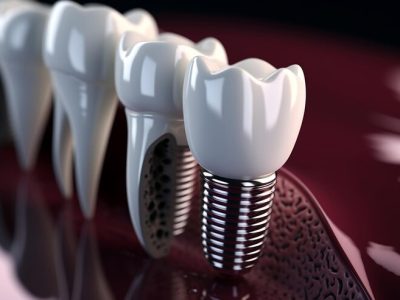Understanding Dental Implants: A Comprehensive Guide

Dental health is not merely about a radiant smile or fresh breath; it’s an integral component of overall well-being. It significantly impacts our ability to chew, speak, and convey confidence. However, various factors such as tooth loss due to injury, decay, or aging can disrupt this equilibrium, triggering a quest for effective solutions.
Dental implants have emerged as transformative remedies, offering a reliable and durable alternative to restore one’s smile and oral functionality. In this comprehensive guide, we navigate through the realm of dental implants, elucidating their components, benefits, risks, and much more.
Understanding Dental Implants: A Comprehensive Dive Into The Future Of Dentistry

Dental implants have revolutionized dentistry, providing a groundbreaking solution for missing teeth. These innovative prosthetic replacements are meticulously designed to mimic the structure and function of natural teeth. Unlike dentures, which can be uncomfortable, inconvenient, and sometimes prone to slipping, dental implants are surgically embedded into the jawbone, providing a sturdy foundation for replacement teeth. The fundamental components of a dental implant include the implant itself, an abutment, and the crown.
- Implant: The implant is typically crafted from titanium and surgically placed into the jawbone to replace the root of a missing tooth. Titanium’s biocompatibility ensures that the jawbone readily fuses with the implant through a process called osseointegration.
- Abutment: The abutment acts as a connector that supports the crown and links it to the implant. It plays a crucial role in securing the crown firmly in place.
- Crown: The crown, usually fabricated from high-quality materials like porcelain, is the visible part of the implant that closely resembles a natural tooth. It’s custom-made to match the shape, color, and alignment of your existing teeth.
Types Of Dental Implants: Tailoring The Solution To Your Needs
Dental implants come in various types, each serving specific needs and situations.
- Endosteal Implants: These are the most common type of dental implants, directly implanted into the jawbone. Their popularity stems from their durability, strength, and high success rate.
- Subperiosteal Implants: In cases where the bone height is insufficient for endosteal implants, subperiosteal implants come to the rescue. They are placed on or above the jawbone but beneath the gums, and they are especially beneficial for patients with a shallow jawbone.
The choice of dental implant type depends on numerous factors, including the patient’s oral health, bone density, and specific requirements. A detailed consultation with a dental professional is vital to determine the most suitable type based on individual circumstances.
Unveiling The Dental Implant Journey: A Step-By-Step Guide

Embarking on the journey to dental implants involves a series of steps, meticulous planning, and collaboration between dental experts. Let’s navigate through the primary stages:
- Initial Consultation: The process commences with a comprehensive examination and consultation to assess the patient’s oral health, discuss treatment options, and formulate a personalized treatment plan. A thorough evaluation of the patient’s medical history, dental status, and lifestyle factors is crucial in this stage.
- Implant Placement: Once the treatment plan is established, the actual implantation procedure takes place. The dental implant, often made of titanium due to its excellent biocompatibility, is surgically placed into the jawbone to replace the missing tooth’s root. This step is crucial as it forms the foundation for the entire dental implant.
- Osseointegration: Following implant placement, a healing period is allowed for osseointegration, where the implant fuses with the surrounding bone. This phase is vital for ensuring the stability and durability of the implant.
- Abutment Attachment: After osseointegration, an abutment is attached to the implant. This component serves as a connector, linking the implant to the crown, and allowing for the custom-made crown to be securely placed.
- Crown Placement: The final step involves mounting the custom-made crown onto the abutment, concluding the dental implant process. The crown is meticulously designed to match the color, shape, and alignment of the patient’s existing teeth, seamlessly blending into the natural smile.
The Myriad Benefits Of Dental Implants: A Testament To Modern Dentistry
Dental implants have gained popularity for a multitude of reasons, solidifying their position as the preferred choice for tooth replacement:
- Enhanced Aesthetics: Dental implants closely resemble natural teeth, providing a harmonious and natural look that boosts the patient’s appearance and self-confidence.
- Restored Oral Functionality: They effectively restore normal chewing and speech capabilities, allowing individuals to consume their favorite foods without discomfort and articulate clearly.
- Preservation of Bone Structure: Dental implants stimulate bone growth and prevent bone loss. This not only maintains the facial structure but also averts a sunken appearance, contributing to a youthful look.
- Longevity and Durability: With proper care and maintenance, dental implants can endure a lifetime, providing a long-term and cost-effective solution to tooth loss.
Identifying The Ideal Candidates For Dental Implants: A Customized Approach
Ideal candidates for dental implants are individuals with good oral and overall health. Adequate bone density is crucial for the success of the implantation. Factors such as gum health, general well-being, and commitment to oral hygiene also significantly impact the suitability of dental implants. A detailed evaluation by a dental professional is essential to determine candidacy.
Dental Implants Vs. Other Alternatives: The Unmatched Superiority
Comparatively, dental implants hold a distinct advantage over traditional alternatives like dentures and bridges. Dentures, while a long-standing solution, can be uncomfortable, prone to slippage, and require regular removal for cleaning. Bridges, although fixed, necessitate modifying adjacent healthy teeth for support, potentially compromising their integrity. In contrast, dental implants offer a stable and enduring solution without affecting neighboring teeth.
Mitigating Risks And Ensuring A Safe Journey
While dental implants have a high success rate and are generally safe, like any surgical procedure, risks are inherent. Potential risks include infection at the implant site, nerve damage, or sinus problems for implants in the upper jaw. However, with meticulous evaluation, careful planning, and the expertise of skilled professionals, these risks can be mitigated effectively.
Upholding The Longevity Of Your Dental Implants: A Shared Responsibility
Caring for dental implants is akin to caring for natural teeth. Regular brushing, flossing, and routine dental check-ups are vital to maintaining oral health and prolonging the life of the implants. Dental professionals may recommend specific oral hygiene practices tailored to individual circumstances. Moreover, adhering to a healthy lifestyle and dietary habits further contribute to the longevity and effectiveness of dental implants.
The Financial Landscape Of Dental Implants: A Wise Investment In Oral Health
The cost of dental implants varies based on several factors, including the number of implants, type, location, and the need for additional procedures like bone grafting or sinus lifts. While the initial cost of dental implants might appear higher than alternatives, their longevity and durability make them a cost-effective choice in the long run. Additionally, many dental practices offer financing options to ease the financial burden on patients.
Doctors Implants: A Paradigm of Excellence
In the realm of dental implants, Charleston dental implants at Doctors Implants stands as a paradigm of excellence for individuals seeking to restore their smiles and oral health. Charleston dental implants, with their cutting-edge dental technology and a team of proficient professionals, ensure patients receive top-notch dental implant services. These experts provide guidance throughout the entire implant process, ensuring a seamless and successful experience for patients.
In Conclusion: Embracing The Transformative Power Of Dental Implants
Dental implants have revolutionized the field of dentistry, providing an innovative and effective solution for missing teeth. Understanding the components, processes, benefits, and considerations associated with dental implants is pivotal for anyone contemplating this transformative dental procedure. A consultation with a dental professional, a meticulous assessment, and a personalized treatment plan can pave the way to a confident smile and optimal oral health with dental implants. With diligent care and maintenance, dental implants can truly metamorphose one’s life, offering a reliable and aesthetically pleasing solution for missing teeth. Dental implants herald a life-altering solution, improving not just oral health but also boosting self-esteem and overall quality of life.
Read Also:

























